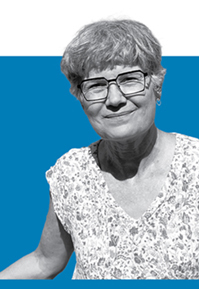
Susanna Peyton ’83MSN
After graduating from college with a degree in Latin American history, Susanna Peyton assumed she would go to law school. She began to study for the LSAT. To support herself, she took a job in a group home for men and women with intellectual disabilities—called “mental retardation” at the time—who had been recently discharged from Boston State Hospital.
“I thought it was scary, and I knew nothing about that work,” she says. But as time went on, “I began to think to myself, ‘What kind of life do I want?’ and I found myself really caring about the people around me.” One supervisor in particular, who had a nursing degree, inspired Peyton. That became the path she followed.
After almost a decade as a nurse practitioner on psychiatric floors, Peyton and her family moved to Massachusetts, where she began to work with Operation House Call, a nonprofit that teaches young medical professionals how to care more effectively for people with intellectual or developmental disabilities.
Peyton now coordinates home visits between families and students, who come from a growing list of nursing and medical schools. She also developed and taught a class on what atypical development can look like and what interactions with these patients can do when it is done properly.
Her personal life intersects with this professional arc. In 1986, Peyton and her husband had their first child. He had Down syndrome. Though she had been tested during pregnancy, the test had returned a false negative. “When he appeared at birth it was a surprise,” she says. She was working in mental health practice during the day and then returning home to care for her son at night. She kept these worlds separate, however. “My reaction was simply to be a good parent, and I didn’t know how to be that yet.”
 loading
loading